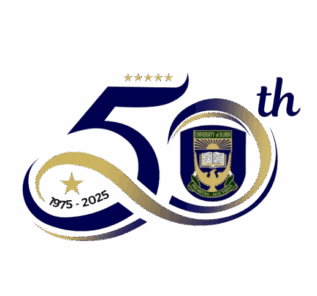By Mustafa Abubakar and Felicia Samuel
Students of the Departments of Geology and Geophysics, University of Ilorin, have donated two advanced workstation systems valued at approximately ₦3 million to enhance teaching, research, and industry-based training for undergraduates in the Faculty of Physical Sciences.
The workstation units, designed to run high-end petroleum and subsurface interpretation software, were commissioned last Monday (November 3, 2025) during a brief ceremony at the office of the Dean.
Speaking at the presentation by the representatives of the Students’ Association, the Dean of the Faculty of Physical Sciences, Prof. O. A. Adekeye, congratulated the students and emphasised the importance of sustainable, student-driven development.
The Dean said, “This is a model for others. You have demonstrated unity, academic priority, and vision. You did not wait for the University; you created value yourselves.”
He explained that the new workstation facility is expected to support reservoir modelling and interpretation, geological mapping and structural modelling, subsurface data analysis for oil and gas exploration, capacity building for research and internships, and student access to industry-grade software and workflow.
According to Prof. Adekeye, the facility will significantly enhance practical exposure and position the University competitively among geoscience-training institutions in Nigeria.
He also commended the outgoing executive committee of the Association for their dedication and commitment to mentorship.
“We believe this gift will keep preparing future students. Leadership is not about the time you spent; it is about the traces you leave behind,” he said.
In his remarks, the Head of the Department of Geophysics, Prof. Saminu Olatunji, described the project as “rare and exemplary.”
Prof. Olatunji said, “There are departments that apply for this kind of facility and wait months for approval. Yet these students made it happen through grit and foresight. They achieved two key things: uniting two departments academically and investing in learning tools instead of entertainment. This is exceptional.”
Similarly, the Head of the Department of Geology, Dr Mumin Yusuf, commended the initiative and acknowledged the role of the Assistant Faculty Advisor to the student Associations, Dr Omolaye Gabriel, for guiding the students and mobilising alumni and industry partners.
Dr Yusuf said, “The vision was theirs, but direction, commitment, and mentorship were key. Dr Gabriel followed up with industry contacts, travelled with them to Lagos, and supported the dream with his goodwill. The result is a practical laboratory that will strengthen our academic-industry handshake.”
He added that the equipment will support undergraduate projects, practical sessions, and research-driven innovation.
In his own remarks, Dr Gabriel described the development as “evidence of responsible student leadership.”
According to him, “This is what student unionism should be: service, impact, and legacy. These systems will make our graduates globally competitive. The next administration must not relax. They must do more.”
The President of the Geology Students’ Association, Joseph Akindoye, said the project was conceived to address a long-standing gap in geoscience training, noting that the systems were procured from funds raised during the 2024/2025 Geoscience Week, jointly organised by the two associations.
According to him, it is the first time in the University’s history that both Departments hosted a unified Geoscience Week and executed a joint capital Development project without institutional funding.
“Our curriculum is strong, but our practical exposure needed reinforcement. These workstations run the same software used in Chevron, Mobil, Shell, and NNPC for subsurface interpretation. We wanted to ensure that students gain industry-ready experience even before graduation. It is our legacy to the Department and future students,” he said.
Akindoye noted that merging the annual student week was strategic, attracting greater industry attention, alumni support, and resource pooling.
“The project demonstrates what student leaders can achieve through cooperation and clear vision. We did not receive a single kobo from the Departments. Everything came from our planning, fundraising, late-night meetings, calls, and industry visits. We believe student leadership should build systems, not just host parties, he said.”
He encouraged incoming executives to sustain and improve the initiative, stressing that innovation and continuity are essential to academic progress.
